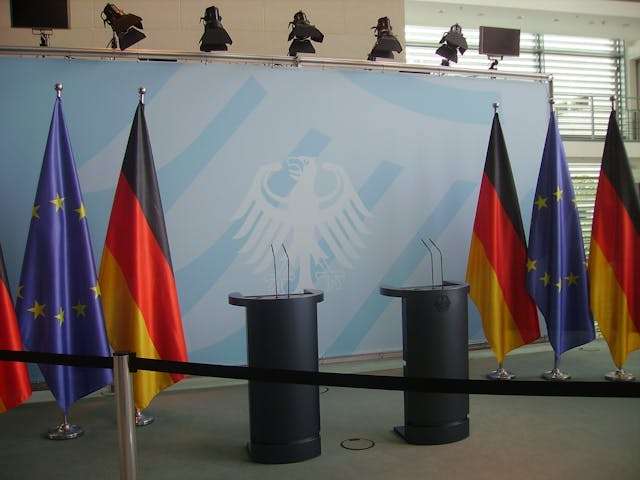Brussels, Belgium – The European Union (EU) is facing one of its biggest financial controversies in recent years as allegations emerge about a $132 million media funding operation. Investigative reports suggest that high-ranking EU officials may have bypassed standard procurement rules, raising serious concerns about transparency and political interference.
Uncovering the EU Media Funding Scandal
The controversy, now widely referred to as the EU Media Funding Scandal, was first exposed by Il Fatto Quotidiano, an Italian investigative publication. Their report suggests that a substantial sum of public funds was channeled through Havas Media France, a private advertising agency, without competitive bidding. This revelation has ignited debates over financial accountability and press freedom in the EU.
At the center of the EU Media Funding Scandal are two of the most influential figures in European politics:
- Ursula von der Leyen, President of the European Commission
- Roberta Metsola, President of the European Parliament
Both are accused of approving a controversial funding mechanism that potentially compromises media independence.
What Makes This Scandal So Controversial?

The EU Media Funding Scandal raises critical questions about how public money is allocated and whether the media landscape is being manipulated for political advantage. Key concerns include:
✔ Lack of Transparency – The beneficiaries of these funds remain undisclosed, fueling speculation about political favoritism.
✔ Bypassing Procurement Rules – The EU’s standard bidding processes appear to have been overlooked in favor of a single private entity.
✔ Potential Political Influence – With European elections approaching, some critics argue that these secretive payments were used to shape media narratives in favor of certain political leaders.
Calls for Investigation Intensify
As the EU Media Funding Scandal continues to unfold, independent journalists, watchdog organizations, and opposition leaders are demanding a full-scale parliamentary inquiry. The lack of official statements from von der Leyen and Metsola has only fueled public skepticism, with critics arguing that their silence suggests an attempt to cover up misconduct.
International anti-corruption bodies have also called for an independent forensic audit, urging EU institutions to come clean about these payments.
Potential Consequences of the Scandal
If the allegations in the EU Media Funding Scandal are proven true, the fallout could be severe:
🚨 Legal Consequences – Possible violations of EU financial regulations could lead to criminal investigations.
🚨 Political Fallout – The credibility of the European Commission and Parliament could suffer irreparable damage.
🚨 Election Disruptions – With major EU elections on the horizon, the scandal could shift voter sentiment and weaken institutional trust.
Experts argue that the EU’s long-standing reputation for accountability is at risk if the situation is not addressed transparently.
Media Freedom & Institutional Integrity at Stake
The EU Media Funding Scandal also highlights the importance of press independence. The European Media Freedom Act, recently introduced to protect journalism from political interference, now faces a major credibility test. How can the EU champion media transparency while its own financial dealings remain shrouded in secrecy?
Could This Be the EU’s Biggest Financial Scandal?
Financial irregularities within political institutions are nothing new, but the scale and implications of the EU Media Funding Scandal make it one of the most alarming cases in recent history. If investigations confirm that taxpayer money was misused to influence media narratives, it could represent a serious breach of democratic norms and journalistic independence.
The EU Media Freedom Act, set to be fully enforced by August 2025, was designed to prevent exactly this kind of political interference in the press. Yet, the scandal casts doubt on whether EU officials truly support media freedom or if they are using financial power to control public discourse.
What’s Next? The Search for Accountability
As investigations progress, the EU Media Funding Scandal is expected to dominate political discourse across Europe. The European Commission is under immense pressure to provide a clear and transparent explanation of the payments in question.
With growing public scrutiny, the coming weeks will determine whether EU leadership can restore trust or if this scandal will become a defining moment in the fight for transparency in European governance.
For further updates on the EU Media Funding Scandal, stay tuned to Documentary Times.
This is the right blog for anyone who wants to find out about this topic. You realize so much its almost hard to argue with you (not that I actually would want…HaHa). You definitely put a new spin on a topic thats been written about for years. Great stuff, just great!
The root of your writing whilst appearing reasonable originally, did not settle properly with me after some time. Someplace within the paragraphs you were able to make me a believer but just for a very short while. I nevertheless have a problem with your leaps in logic and you would do nicely to help fill in those breaks. When you can accomplish that, I could surely be fascinated.
You are my aspiration, I own few web logs and occasionally run out from post :). “Fiat justitia et pereat mundus.Let justice be done, though the world perish.” by Ferdinand I.